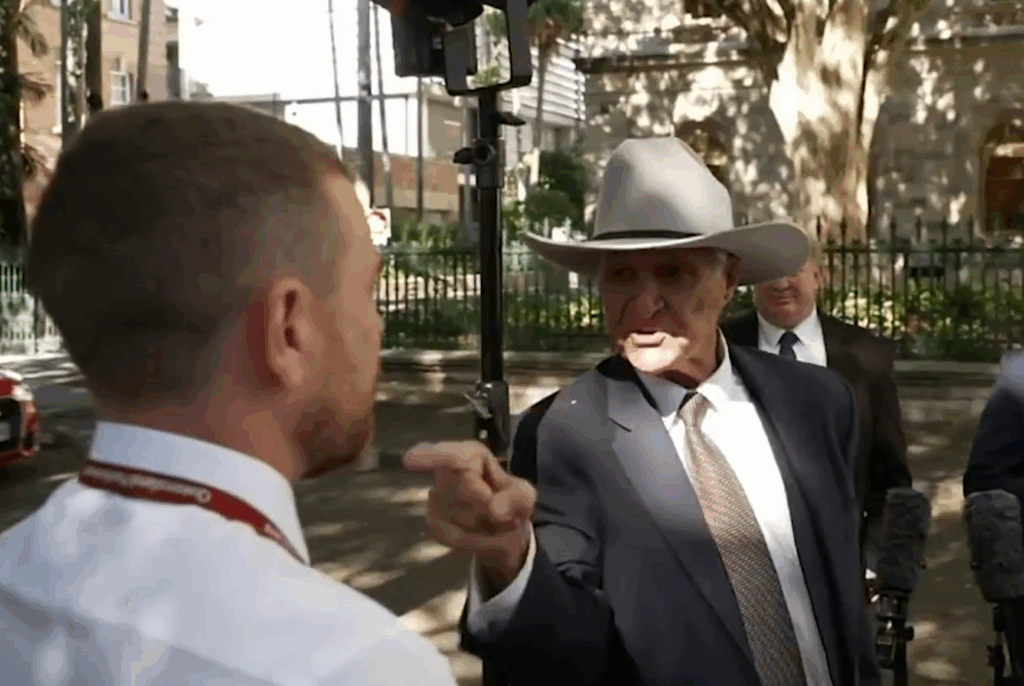At a press conference outside Queensland’s Parliament on Thursday, veteran MP Bob Katter erupted in fury when Channel 9 journalist Josh Bavas asked about his Lebanese heritage.
Katter, visibly agitated, interrupted the question with a clenched fist and a chilling declaration: “I’ve punched blokes in the mouth for saying that. Don’t you dare say that. My family have been in this country for 140 years”.
The exchange escalated as Katter accused Bavas of racism and physically approached him, shaking his fist and calling him “a racist”.
This wasn’t the first time Katter reacted defensively to questions about his background. His grandfather, Carlyle Assad Khittar, who later changed his name to Carl Robert Katter, migrated from Lebanon in the late 1800s, was born in Bcharre, a town in Mount Lebanon a picturesque town known for its deep cultural and religious heritage, nestled in the mountains of northern Lebanon. It’s also famously the birthplace of poet and philosopher Khalil Gibran. Despite this lineage, Bob Katter has long resisted public acknowledgment of his Lebanese roots, often framing such inquiries as attacks on his Australianness.
But here’s the truth Bob, heritage isn’t something you can erase. It’s not a blemish to scrub away or a burden to hide. It’s a part of you. Woven into your story, your family, your identity. I know this intimately. I came to Australia in 1977 with my parents and grandfather, fleeing the chaos of the Lebanese Civil War. I was just a year old. We came in pursuit of safety, stability, and a better life. Like many Lebanese families who arrived during that time, we worked hard, built lives, and contributed to the fabric of this country.
Lebanese migration to Australia began in the 1850s, but it surged during the civil war from 1975 onwards. Thousands of families like mine sought refuge here, and we brought with us values of resilience, community, and hard work. We are Australian. And we are Lebanese. Both truths coexist.
Bob, I understand the exhaustion of being asked, “Where are you from?” I have been there many, many times, mate. As if your skin, your name, or your accent disqualifies you from being truly Australian. I’ve tried to deny my heritage, hide it, run from it. But it always finds you. And yes, it sucks. It sucks to feel like you’re never quite accepted, no matter how long your family has been here, how much you’ve contributed, or how deeply your roots run.
But here’s the irony. While you were defending your ‘Australianness’ with clenched fists, you were also promoting an anti-immigration rally, one supported by fringe groups that advocate for a return to the White Australia policy. A policy that would have barred your grandfather and mine from ever setting foot on this land.
You can’t have it both ways. You can’t claim the pride of a 140-year legacy while standing shoulder to shoulder with those who would erase that legacy. You can’t deny your heritage while weaponizing it against others.
When someone asks me now, “Where are you from?” I say, “Australia. Where are you from?” It throws them off. They reply, “Australia,” as if my question is absurd because they are white, and I’m not. My olive skin and curly hair don’t fit their image of what “Australian” looks like.
But we all come from somewhere. Unless you are a First Nations person, this land is not originally yours. It belongs to them. The rest of us, Lebanese, English, Irish, Italian, Vietnamese, Sudanese, and many more, we are migrants. I’ve come to embrace my dual identity. I am privileged to choose the parts I love about being Lebanese and Australian. The food, the culture, the music. And when I visit Lebanon, part of me feels at home, even though Australia is my home.
This country is great because of its diversity. Because of families like mine who worked hard to survive, to educate ourselves, to build futures. We belong here. We are part of the tapestry that makes Australia strong, vibrant, and resilient.
So Bob, don’t get offended when someone asks where you’re from. I know it’s tiring. But maybe, just maybe, it’s time to stop running from your heritage and start owning it. Because no matter how hard you try, you can’t punch away the truth.
Bob, your outburst wasn’t just about a question. It was about a deep discomfort with identity.
But as Antoinette Lattouf so eloquently put it: “Bob, habib, cuz. Spread hummus not hate.”

